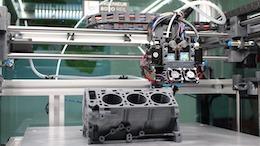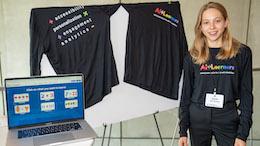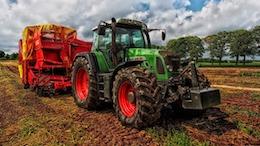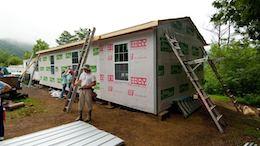
100 ideas, $400 each, no strings attached
By Syl Kacapyr
Four-hundred dollars might not change the world, but it can change someone’s world.
That’s the intent behind the Contribution Project, which last year handed out $400 each to 100 Cornell undergraduates, with no strings attached other than for the students to spend the money by improving something in the world. The students were selected randomly from a pool of qualified applications and could ultimately choose how to spend the funds.
Nine engineering and computer science students were among those selected by the Contribution Project. Since receiving the funding in February 2022, some students have created their own initiatives, while others have contributed to existing ones. From repairing homes in West Virginia and supporting small farmers, to recycling plastic waste and helping students with disabilities, here is how the students proposed to contribute:

1. Recycling plastic waste with 3D printing
Jeffrey Wilcox ’25 is designing and constructing a machine that takes plastic waste and converts it into 3D-printer filament useable in desktop printers. The goal is to help reduce plastic waste and allow hobbyists to continue printing while decreasing their environmental impact.

2. Cornell review platform
Jay (Jaehyung) Joo ’24 is creating Sentiment, a discussion platform for students to share opinions on courses, dorms and clubs. Still in its beta form, Sentiment already has 5,000 posts and 8,000 registered courses and clubs, among other experiences to review. The official platform will launch soon, and Joo plans to build other Cornell-specific platforms, including Cornlet, a sublet marketplace; RideHub, a carpool finder; and ThriftHub, a second-hand marketplace.

3. Scannable information cards
Moreblessing Mushohwe ’24 originally intended to create an information card with a magnetic strip that, once scanned, would allow people to find information about and schedule appointments with centers on Cornell’s campus. Mushohwe eventually found a simpler solution that benefited a local non-profit – he created scannable business cards for the Ithaca Pregnancy Center using QR codes, which have been especially helpful during outreach events.
“A highlight so far is the event that took place on November 18 when the Ithaca Pregnancy Center had a fundraising banquet and those cards came in handy as people were able to scan them and get to the website to make donations or learn more about the organization,” Mushohwe said.

4. Education platform for students with disabilities
Adele Smolansky ’23 – Is supporting AI-Learners, a platform that makes learning math accessible and engaging for students with cognitive, physical and behavioral disabilities through personalized computer games and analytics. The platform is personalized, using a student’s disability and past performance to recommend games that adapt to their learning over time.
“I was inspired to create AI-Learners by my younger sister, Lara, who has a severe neurological disability called Rett Syndrome. Growing up, I watched Lara struggle to use technology and access sufficient educational opportunities, especially during the COVID pandemic,” Smolansky said. “I quickly learned that Lara is just one of many students with a disability who has a problem learning math from current EdTech websites. My personal experiences and my conversations with hundreds of parents and educators inspired me to dedicate my professional life to improving educational resources for students with disabilities.”

5. Task reward app
Claire Zhou ’23 is creating an application that rewards someone for doing something regularly. Once a user completes a task – exercising or reading, as an example – they can earn experience points and unlock new avatars, skins and other customizations for their in-app characters.

6. Mechanobiology education online
Rocky An ’23 is creating an online space through Reddit for students and professionals to discuss mechanobiology and share resources. The subreddit “r/mechanobiology” features discussions about related topics such force in nature, medicine and space bioscience, and offers a place to share interactive 3D simulations, graphics and diagrams, among other assets.

7. Data tracking for small farms
Somil Aggarwal ’22 is supporting Agcess, a data tracking tool for agriculture that digitizes and revolutionizes recordkeeping for smallholder farmers. Aggarwal co-founded a startup based around the tool, and said the project has expanded into a nine-member team working on brining digitization to data tracking in agriculture.
“I was inspired to create Agcess after realizing how much enthusiasm and support there was both at Cornell and its broader network in New York state,” Aggarwal said. “Ultimately, we’re trying to level the playing field in agriculture and improve food security through supporting smaller, more local farmers.”

8. Improving homes in Appalachia
Bennett Miller ’22 is helping the Appalachia Service Project acquire better materials to help repair and improve homes in West Virginia and the surrounding Appalachian region.
“The contribution ended up helping fund our trip, where we did a bunch of great work,” Miller said. “I myself helped install part of a new floor and ramp.”

9. Community craft cafe
Keying Lao ’22 is creating a pop-up craft cafe that consists of drinks and desserts, along with art kits that can be used by patrons in the cafe. Lao said the cafe is a way for people to spend time with each other in person and not on a screen.
About the Contribution Project
The Contribution Project is a product of Cornell’s Bronfenbrenner Center for Translational Research, with funding from the youth-empowerment organization HopeLab. It began in 2019 with an Engaged Scholar Prize awarded to Anthony Burrow, professor and director of the Bronfenbrenner Center, who used the funding to support 50 projects. The tradition continues today and applications for the 2023 Contribution Project are now open through Feb. 17.

